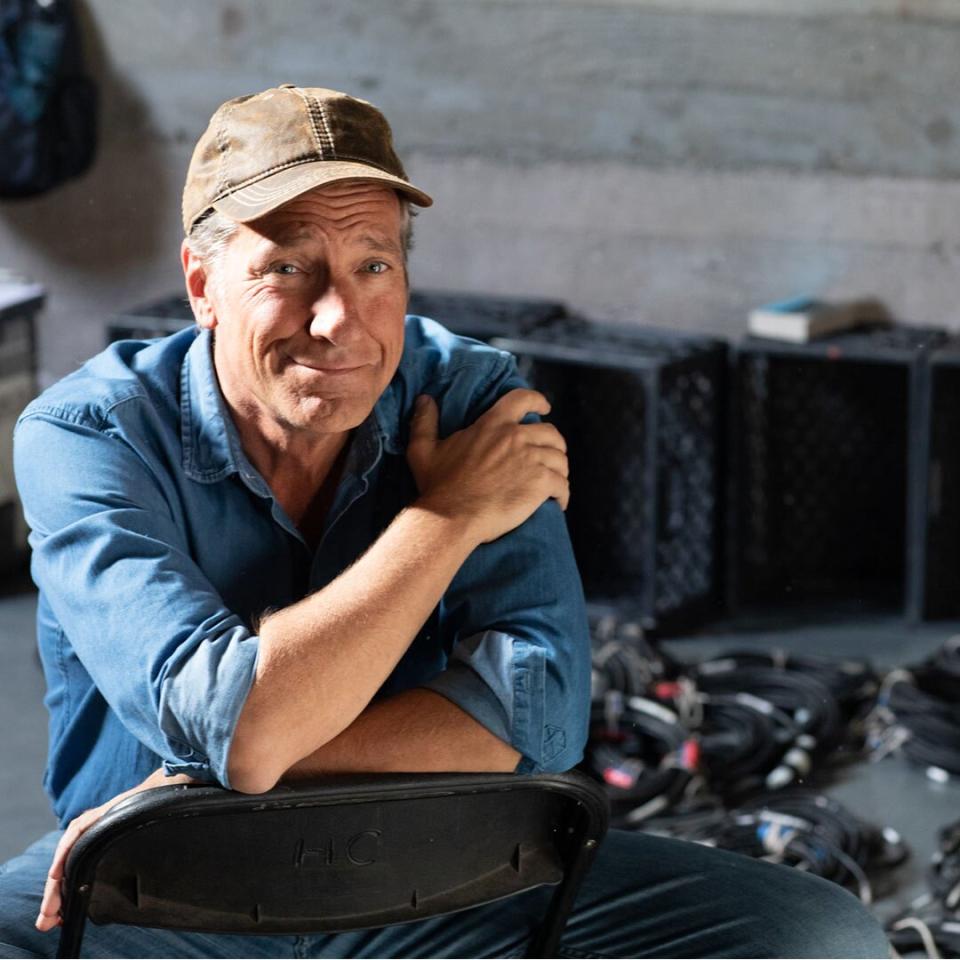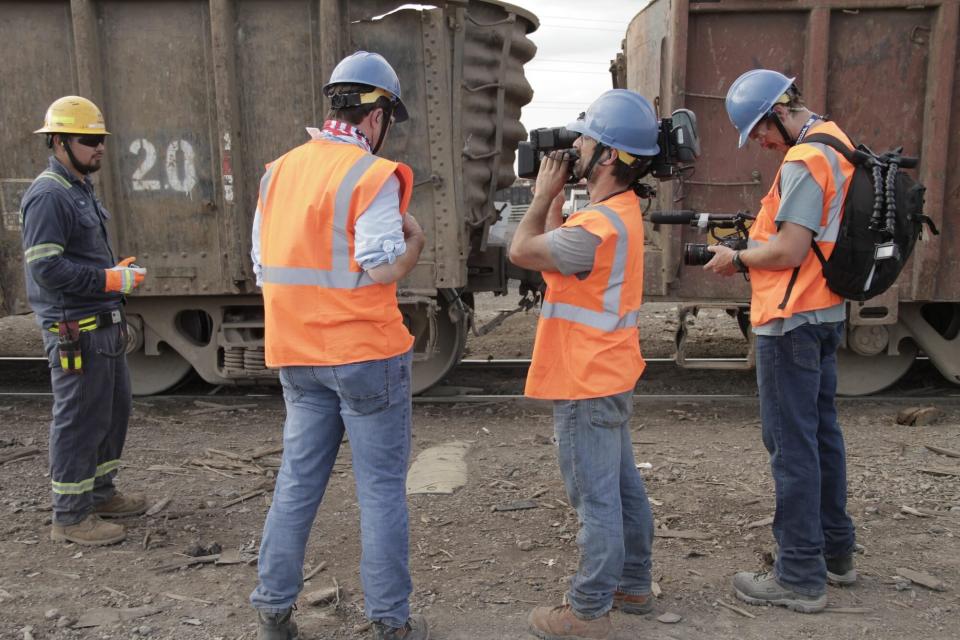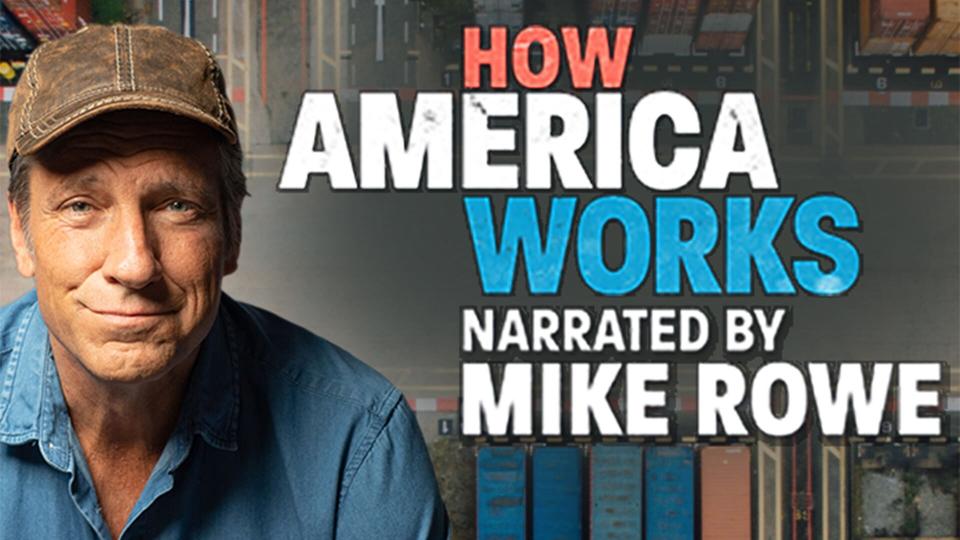Dirty Jobs ' Mike Rowe Has a New Show About the Nitty-Gritty of Work (and Talks a Bit About His Personal Life)
- Oops!Something went wrong.Please try again later.
- Oops!Something went wrong.Please try again later.
Don't tell anyone, but the "dirty little secret" of Mike Rowe's career — in his own words — is that he's been making variations of the same show for decades.
First Dirty Jobs on Discovery (his breakout series, which is about to be revived) and Somebody's Gotta Do It on CNN and Returning the Favor on Facebook and now, in his return to primetime, How America Works on Fox Business Network.
"It's all kind of the same show," Rowe tells PEOPLE a little wryly. But that's the point: The format and platforms vary, but not the focus on what it means to do a job, in all its nitty-gritty glory.
And Rowe's job, he says, "is to tap the country on the shoulder, as best I can, and say, 'Hey, what about him? What about her?' I just change the title of the show every six or seven years, but that's really all I've been doing since 2001."
RELATED: Dirty Jobs Host Mike Rowe on His 82-Year-Old Mom's Writing Career — 'It's Never Too Late'

Michael Segal Mike Rowe
Unlike some of his previous shows, Rowe, who also hosts a podcast and runs the mikeroweWORKS foundation, will be narrating How America Works rather than be its on-camera personality.
He had been interested in returning to his favorite themes, he says, when a production company and Fox approached him with the series.
"It wasn't a question of, should I do it? I have to do it," says Rowe, 59. "And I'm glad to do it, because I think people are going to dig it."
"Look," he says, "if the show does one thing — I think it's going to do several things, but if it does just this one thing, I will deem it a huge success — if it makes people pause for a moment when they flick the switch and see the lights come on, if it makes them go, 'That's a freaking miracle. I had forgotten,' then this is all good, right?
Below, the host talks about his new project, why he only opens up a little about his personal life (and his longtime partner) and why he's kept so very busy during the pandemic.
"I feel fortunate to be on somewhat of a mission, and that mission allows me to work in lots of different ways," he says. "But no, I can't imagine retiring."
How America Works premieres Monday (8 p.m. ET) on Fox Business Network.
PEOPLE: I want to start with a textbook question. How America Works is about infrastructure, literally — but why that topic, and what does it mean to you to get people to pay attention to it?
Mike Rowe: You know, civilized life is basically held together by pipes — whether it's plumbing pipes, or cables that allow us to have this conversation. So all that stuff, it's the connective tissue. And my pop used to say to me, "Think of infrastructure like the grout in-between tiles in a mosaic. It's the mortar between the bricks. It's the stuff that connects everything." And without it, civilization goes off the rails pretty quick.
PEOPLE: You've been focusing on American work for years. Have you seen things change in the culture?
Rowe: The honest answer to that question is a 350-page book I can't get around to finishing, but the short version is both micro and macro. Our personal relationship with work has shifted in the same way our thoughts about education have shifted. College needed a PR campaign 50 years ago. And it got one. Unfortunately, that PR came at the expense of skilled labor. We took shop class out of high school and we started telling kids, "Look, it's not enough to say a four-year degree is a good thing." We started saying, "If you don't get one, you're going to get stuck over here, turning a wrench, we're doing something unsavory." And my mission, to the extent that I have one, is to confront some of the myths and misperceptions and stigmas and stereotypes that keep people from pursuing a career in the trades.

FOX business How America Works
PEOPLE: Could you preview some of the jobs and people you learned about on the show? Any that surprised you?
Rowe: These aren't lectures, this isn't a polemic. This is us taking a single topic like logging and saying, "Okay, maybe you've heard some things about logging. Maybe you have formed some opinions about it." Rather than telling you how to think about the industry, we just introduce you to the regular people who put bread on the table by getting us the lumber we need to build the desk you're sitting at right now and the one underneath this glass, right? We just make it as personal as we can. We do the same thing with energy. We do the same thing with electricity. We go to the Hoover Dam and we just spend a day with people who are trying to repair and maintain the turbines, which provide electricity for about a sixth of the country. We do the same thing with waste management, just by hanging out with some garbage people for the better part of a day.
And people will be surprised by the degree of sophistication that informs all of these vocations. They'll be surprised by the passion that these workers feel for their jobs.
People are very confused about energy in general. And look, this is headline news, right? And the show doesn't try to be political or polemic, but you can't help but make the point: When it comes to energy, a lot of people think about electricity as being fundamentally clean, whereas maybe coal or oil they might think of as fundamentally dirty. What most people don't really understand though, is that their Tesla or their Prius that they plug in and feel great about plugging in, uses electricity and that electricity doesn't come from the electricity tree. It comes from a turbine and that turbine is spinning, and in the vast majority of cases, the energy that's being used to spin that turbine is being provided by natural gas or oil. And so what I hope we learn from the series is the way that we all are truly interconnected. You can't just arbitrage the part of the workforce that makes you uncomfortable in the equation.
PEOPLE: In many ways it still feels like you're the person talking about these issues and making it into a format people can consume.
Rowe: Yes, it's weird. It's unexpectedly gratifying. Look, I've been in TV my whole life, and for the first 20 years of it, I was … Well, I wasn't ashamed of anything I did, but I wasn't proud. I've worked on a lot of different projects for a lot of different networks, but it really wasn't until 2001, when I pitched a show that turned into Dirty Jobs. It wasn't until that started to happen that I started to feel like, you know, maybe there's a way to take the success of this show — and I hate to use the word because it's so precious — but most shows don't get "legacies," you know? The lucky ones get spin-offs, but Dirty Jobs gave me permission to talk about all of these things. And it made me a logical choice to narrate How America Works.
RELATED: Mike Rowe 'Laughed' When He Saw 'Mike Rowe for California Governor 2022' Article

fox business
PEOPLE: So catch me up beyond the show, outside the show. You're Zooming from your office right now. Are you in California?
Rowe: Yeah, the mail comes to Northern California, where I continue to exist for five, six, sometimes seven days a month. We never stopped shooting. We pivoted, but back in March [2020] when the lockdowns started, I talked to the president over at Discovery and we got the first Zoom show in the country on the air in April. And then we took Dirty Jobs back out on a road trip. And so we shot six of that. Then we shot six episodes of something called Six Degrees, which I'm really proud of. And then we went back into production on Dirty Jobs. So new episodes of that sometime in October. And that I doubled down on my podcast, The Way I Heard It, because when you're trapped here in your office looking for stuff to do, it's like, okay, yeah, podcasting. So that thing blew up and now projects like How America Works. It's, look, the key is to do everything as best you can. And if you're constantly reverting to a larger mission, which again is, "Hey America, check him out, check her out," then you'll always find a different way to do it.
I mean, I don't know how you feel, but I'm on a first name basis now with every UPS, FedEx and Amazon driver in California. They know me, I know them. I know the people that look after the wires that allow us to have this conversation. So, I think that if there's a silver lining in all this, it has heightened people's understanding of who's doing the wet work.
PEOPLE: And what's happening in your personal life? Do you do anything for fun? Catch me up on that.
Rowe: So I've been with the same woman for decades. She's not in this business. She is baffled by this business. I'm baffled by her business. This level of mutual bafflement has worked to our advantage. So she's been very patient with me as I fly about the world, doing the things that I want to do. And I think I can say the same. Beyond that, my views on celebrity and private versus personal, I'm not shy about it, but I honestly ask myself, "What's interesting to me?" And what's not interesting to me is a red carpet. I mean, I got nothing against red and I got nothing against carpets, but the celebrity in our culture has become kind of like the Borg in Star Trek. I can't imagine why anybody would care too much about anything else that I do. I get it. It's PEOPLE. So yeah, I have fun. You know, I got a line of whiskey coming out later this year.
In fact, there, you want a scoop? I haven't even announced it yet. I haven't told anybody, but it's called Knobel and it's named after my grandfather and when he died, really his name died with him. He had two girls and there are no more Knobels. So I thought, over the years, so many people have said, "Mike, you know what I'd like to do. I'd like to sit down with you and have a drink, pick your brain." Okay, so I'm going to do that. It's a very limited kind of thing, but we'll raise some money for my foundation by offering a package of a Knobel Whiskey sometime in a month or two, and that's something new to do, you know?
So, why not? I'm game to try virtually anything. But I am loathe to impersonate a celebrity.
This interview has been edited and condensed.

